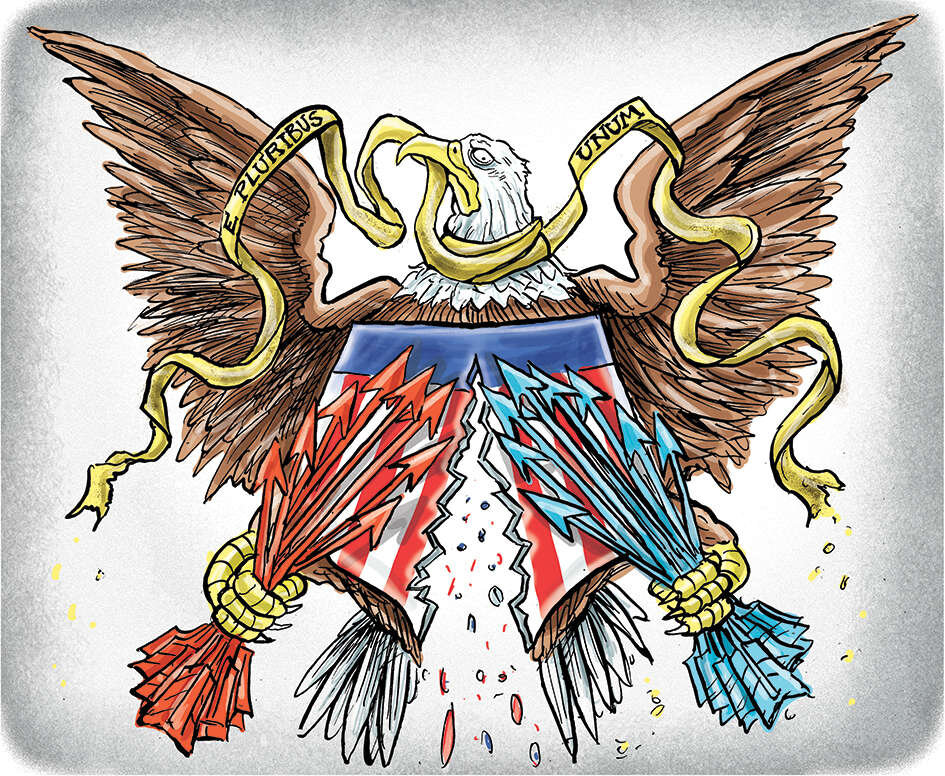
Indians didn’t know what to think. They woke up last Thursday in disbelief to shocking scenes of President Donald Trump’s supporters overrunning the US Capitol. The deliberate assault on democracy by a sitting president, attempting to overturn a fair election, was an ominous moment in American history.
The reaction in India was divided. Some worried that a weakened America would be unable to help India to contain aggressive China breathing down our borders. A few were smug, seeing an America at odds with itself, getting a taste of its own medicine after lecturing the world for decades about democracy. The WhatsApp brigade was busy forwarding gags: “Owing to Covid travel restrictions, this year’s US backed coup will take place at home.” Most thoughtful Indians were fearful, however: If the oldest and longest existing democracy had seen the edge of an abyss, what if it happened in India with much weaker institutions?
Instead of fear, I had the opposite reaction. Trump’s supporters had failed to subvert the constitutional order. It’s because democracies entrust power in institutions, not in rulers. US Congress went on to confirm President-elect Joe Biden’s victory. Even Trump in the end wasn’t above the law. It was a victory for America’s democracy, which had proven its resilience. Liberal democracies are only as robust as their institutions are independent and their officers are honest. The lesson for India is to strengthen our weak institutions.
More worrisome is the tragic divide in America and India which has brought about an ‘Age of Hatred’. The storming of the Capitol wasn’t a one-off occurrence instigated by an unhinged leader. It’s a symptom of a deeper disease that President Biden will have to live with.
In India we must worry about our own uncivil polarisation. Our BJP and Congress parties resemble America’s Republicans and Democrats, behaving like prehistoric tribes that live in wholly different realities determined to annihilate each other. They have forgotten that they are one people, one nation, and part of a common humanity with a conscience.
This tribalism endangers the existence of the world’s two largest democracies. Democracy accepts differences and dislikes, allows room for protest and disagreement, but always under the basic rules of cooperation.
The lesson for India’s divisive politics is that the insurrection in America wasn’t limited to a lunatic fringe. A survey by YouGov reported that 45% Republicans approved of the storming of the Capitol. According to a Reuters/ Ipsos poll, 68% of Republicans believe that the recent US election was ‘rigged’, and 52% believe that Trump had ‘rightfully won’. Since 73 million people voted for Trump, this means that nearly 50 million people in the US doubt the election’s legitimacy. It also explains why 78% of Democrats called the mob on Capitol Hill ‘domestic terrorists’ but 50% of Republicans said they were ‘protesters’ and a third called them ‘patriots’. America is in the middle of an uncivil war.
I too became a small victim of our own uncivil polarisation in the past two weeks. On January 4, I was called vile names by trolls while I was defending the recent sensible reforms in agriculture. Unfortunately, the TV channel headlined only the first part of my statement: “It’s difficult to do reforms in a democracy.” The trolls accused me of supporting dictatorship. What I said, in fact, was: “It’s difficult to do reforms in a democracy; hence, smart reformers spend 20% of their time doing reforms, 80% selling them, carrying people along. Mr Modi failed to do this and he’s got farmer protests.”
The second incident happened at IIT Jammu on January 9, where I was giving the convocation address. I was asked to remove a lovely black cap given to me by the organisers to wear on this festive occasion. Hindu nationalists thought it resembled a Kashmiri Muslim cap and found it offensive. Both incidents left a bad taste in my mouth and are the outcome of the unhappy divide between those who love and those who hate Modi.
There’s no room for the aam admi in the middle, the average Indian who is neither a Modi bhakt nor a Congressia – someone who judges issues on their own merit, not through the lens of those who’d divide us.
America must now impeach Trump to confirm that it holds its president accountable for going rogue. India should take this as a cautionary tale and strengthen its institutions, especially checks on arbitrary power. Some of our institutions have delivered such as our Election Commission, which conducts impeccably much larger elections than the US with few complaints from the losers.
But our judiciary, our police, our bureaucracy and Parliament are in crying need of reform. Why do one in four lawmakers in India have a criminal record? Why should it take 15 years to get justice in the courts? Why is the Indian police the handmaiden of the chief minister, and why does an innocent man fear entering a police station? During the siege of the US Capitol, some bewildered law makers had asked, ‘Where are the police?’
Covid has given both America and India a chance to heal the wounds of divisive politics, an opportunity to show that its citizens are one people. This dastardly deed in America proves that the old hatreds are alive and well. India, at least, has slowed the mad rush towards CAA/ NRC, but that doesn’t mean the old revulsions won’t return. The animosities are extracting too heavy a price in both nations, consuming the energy that should go to restoring the economies after the pandemic. Both nations must stop their uncivil wars!